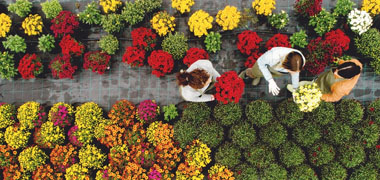
This role has a low level of AI exposure. Core skills such as adaptability, social intelligence, and complex physical tasks remain beyond the capabilities of current AI.
Explore all careersAn Apiarist manages beehives to produce honey and products, ensuring bee health, marketing, and handling physical tasks outdoors in varying weather.
Get qualified to work as an Apiarist with a course recognised across Australia. Speak to a training provider to learn more.


In Australia, a full time Apiarist generally earns $1,300 per week ($67,600 annual salary) before tax. This is a median figure for full-time employees and should be considered a guide only. As you gain more experience you can expect a potentially higher salary than people who are new to the industry.
 Courses.com.au Team
Courses.com.au Team
The beekeeping industry has seen an increase in employment numbers in recent years. There are currently 1,200 people employed as an Apiarist in Australia compared to 1,000 five years ago. Apiarists may find work across all regions of Australia but are more likely to find job opportunities in rural and regional areas.
Source: Australian Government Labour Market Insights
 Courses.com.au Team
Courses.com.au Team
If you’re planning a career as an Apiarist, consider enrolling in a Certificate III in Beekeeping. This course will show you how to extract honey, use smokers and transport a beehive. You’ll explore topics such as establishing an apiary site, assembling and maintaining a beehive and managing a honey bee swarm.
 Courses.com.au Team
Courses.com.au Team
Browse occupations related to Apiarist



For those seeking to embark on a rewarding journey as an Apiarist in the Australian Capital Territory, a variety of courses are available to provide the necessary skills and knowledge. Apiarist courses in Australian Capital Territory not only cover fundamental beekeeping practices but also delve into the management of bee colonies, ensuring you are well-prepared to work in this critical field of agriculture. Whether you are a complete novice or looking to enhance your understanding, choosing the right course is essential to your success.
Among the offerings, the Certificate III in Beekeeping AHC31818 stands out as an exemplary program for aspiring beekeepers. This qualification equips learners in areas such as hive management, honey extraction, and the maintenance of health and productivity within bee colonies. For those specifically interested in pest and disease management, the Manage Pests and Disease within a Honey Bee Colony AHCBEK313 course provides targeted training to help new Apiarists protect and preserve their bees effectively.
The Australian Capital Territory, especially around Canberra, offers unique opportunities for budding Apiarists. Given the region's temperate climate, it's crucial to learn about local flora and fauna that impact bee health and productivity. As a learner, you will discover how to tailor your beekeeping practices to the local environment, maximising the benefits of your operations. The courses available ensure that participants understand both the agricultural and ecological significance of beekeeping in this area.
In addition to Apiarist courses offered in Australian Capital Territory, students may also find pathways into related job roles. One of the most popular positions is a Beekeeper, where individuals can apply their newly acquired skills in a professional setting. The job landscape is rich with opportunities for those who complete their training and gain hands-on experience in managing bee colonies for honey production and pollination services.
Overall, exploring the variety of Apiarist courses in Australian Capital Territory is an important step toward a fulfilling career in beekeeping. With courses designed for beginners and a strong emphasis on practical skills, learners can establish a solid foundation for their future in this vital industry. Whether you aim to work independently or as part of a commercial operation, the knowledge gained will be invaluable in supporting the health of bee populations and contributing to sustainable agricultural practices across the region.